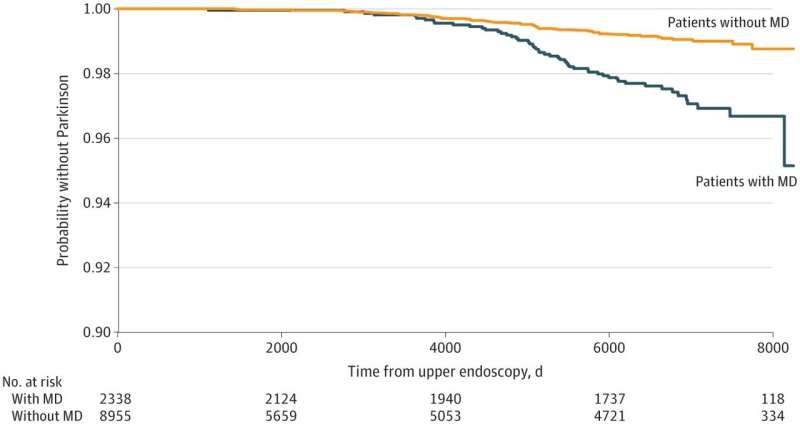This article has been reviewed according to Science X's editorial process and policies. Editors have highlighted the following attributes while ensuring the content's credibility:
fact-checked
peer-reviewed publication
trusted source
proofread
Ulcers, damage to upper gastrointestinal tract linked to increased risk of Parkinson's disease

A study led by researchers at Beth Israel Deaconess Medical Center (BIDMC) found the risk of developing Parkinson's disease was 76% higher among those with a history of damage to the lining of their upper gastrointestinal (GI) tract than among those without.
The study sheds light on the way Parkinson's may develop in some people and also suggests that increased vigilance among those with a history damage to the upper GI tract—typically ulcerations caused by the H. pylori bacterium, gastroesophageal reflux disease (GERD) and/or use of non-steroidal anti-inflammatory drugs (NSAIDS) such ibuprofen—for future Parkinson's disease risk may be warranted.
The findings are published in JAMA Network Open. Co-authors included Jocelyn J. Chang of Tufts University School of Medicine; Subash Kulkarni of BIDMC.
"A growing body of evidence suggests that, at least in a subset of individuals, Parkinson's disease originates in the gut before affecting the central nervous system," said corresponding author Trisha S. Pasricha, MD, MPH, a neurogastroenterologist and director of Clinical Research at the Institute for Gut-Brain Research at BIDMC.
"People often think about the ways the brain influences the gut, but the gut can exert enormous influence on the brain in ways we are still only beginning to understand. Many people who get Parkinson's disease experience GI symptoms like constipation and nausea for years—even decades—prior to developing motor symptoms like difficulty walking or tremors.
"Our lab has been trying to better illuminate this 'gut-first' pathway of Parkinson's disease because it can open new avenues for early intervention and treatment strategies."
Parkinson's disease, a progressive neurodegenerative disorder, affects an estimated 8.5 million people worldwide—a figure that has more than doubled over the past three decades. To explore this "gut-first hypothesis," Pasricha and colleagues performed a retrospective cohort study using patient data from an electronic database encompassing a representation of urban academic centers as well as outpatient clinics and community hospitals in the greater Boston area.
Investigators identified a cohort of patients with no history of Parkinson's disease who underwent an upper endoscopy (EGD)—a procedure to image and diagnose problems in the esophagus, stomach and first portion of the small intestine, which together make up the upper GI tract—between the year 2000 and 2005. Patients with injuries to the lining of the upper GI tract, called mucosal damage, were matched in a 1:3 ratio with patients without mucosal damage. All patients were followed through July of 2023.
Of 2,338 patients with mucosal damage, 2.2% were later diagnosed with Parkinson's disease, while of the 8,955 patients without mucosal damage, 0.5% went on to develop Parkinson's.
After adjusting for confounders, the risk of developing Parkinson's disease was 76% higher among those with a history of mucosal damage than among those without. On average, Parkinson's disease was diagnosed 14.2 years after mucosal damage was detected on an upper endoscopy.
"We found that a history of upper GI mucosal damage was associated with a 76% greater risk of subsequently developing Parkinson's disease, highlighting the necessity for heightened monitoring of these patients," said Pasricha, who is also an instructor of medicine at Harvard Medical School.
"NSAID use is so widespread—from back pain to headaches—and with peptic ulcers globally affecting upwards of 8 million people, understanding the path from mucosal damage to Parkinson's disease pathology may prove crucial to early recognition of risk as well as potential intervention."
More information: Jocelyn J. Chang et al, Upper Gastrointestinal Mucosal Damage and Subsequent Risk of Parkinson Disease, JAMA Network Open (2024). DOI: 10.1001/jamanetworkopen.2024.31949




















